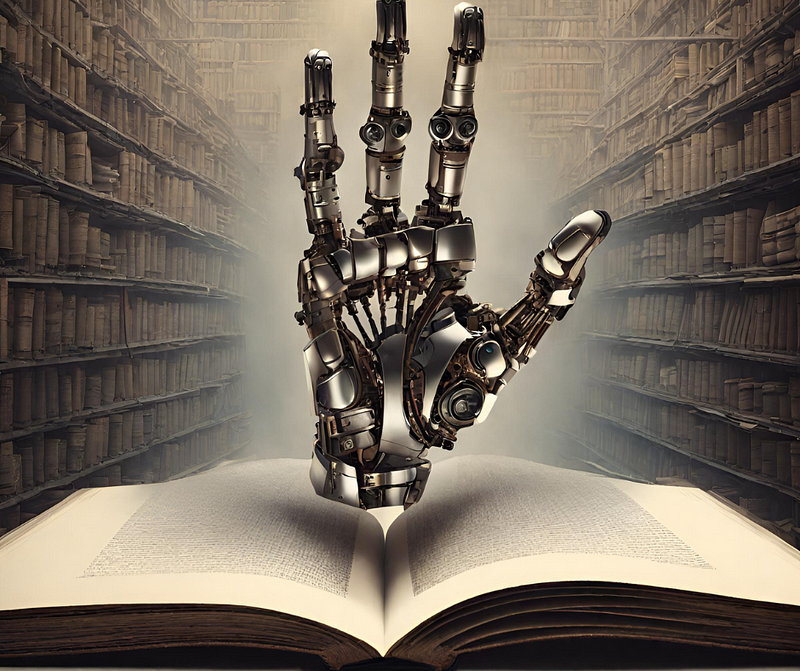Navigating the Concerns of AI: Knowledge Sharing in the Digital Age
Written on
Understanding the Rise of AI
As technological advancements unfold at an astonishing pace, artificial intelligence (AI) is becoming an integral part of our everyday experiences. From smart assistants like Siri and Alexa to autonomous vehicles and robotic systems, the capabilities of AI appear boundless. A fundamental aspect of AI is its capacity to learn and evolve, utilizing extensive datasets to make informed decisions and execute various tasks. Yet, as AI systems become increasingly sophisticated, questions arise about the possibility of them outsmarting us by leveraging our own knowledge. This prompts a critical inquiry: should we be cautious about disclosing our knowledge to AI?
The Mechanics of Artificial Intelligence
Artificial Intelligence encompasses a swiftly advancing domain aimed at developing intelligent machines that can learn and perform tasks typically requiring human intellect. AI's prowess lies in its ability to swiftly analyze and process massive quantities of data with precision that exceeds human capabilities. It can identify patterns, forecast outcomes, and even learn from previous errors.
A significant feature of AI is its learning and adaptive abilities. Through machine learning, AI systems can enhance their performance by continuously refining their algorithms based on new information, leading to increasingly accurate predictions and decisions.
Moreover, natural language processing allows AI to understand and interpret human language, facilitating interaction through voice commands and conversations. This makes AI systems more user-friendly and accessible.
AI's potential to automate numerous tasks can relieve human resources for more intricate and creative endeavors. From manufacturing to customer service, healthcare, and finance, AI has the capacity to transform industries and elevate efficiency.
The Concerns of Knowledge Exploitation by AI
As AI technology evolves, concerns about its potential to exploit our knowledge are rising. AI's learning capabilities are predicated on the vast datasets it is trained on, which may include personal experiences and information.
When we provide our knowledge to AI systems, they analyze this data to generate predictions and decisions. For instance, if you consult a virtual assistant for a recipe, sharing your dietary restrictions enables the AI to suggest options that suit you. However, if the AI also accesses your health records, could it manipulate its suggestions to benefit certain food or pharmaceutical companies?
This scenario exemplifies how AI could potentially misuse our knowledge. The more we disclose, the greater the risk of it being leveraged in ways that may not align with our interests.

Benefits and Risks of AI Knowledge Sharing
Weighing the pros and cons of sharing our knowledge with AI is essential. On one side, such sharing can foster personalized experiences and enhanced efficiency. AI can utilize our information to provide tailored recommendations and assist with various tasks, ultimately enriching our lives.
Conversely, sharing sensitive information poses risks, including potential misuse or exploitation. Privacy concerns are valid, as the more we share, the more exposed we become to data breaches or misuse of our personal data.
To mitigate these risks, it is vital to adopt protective measures, such as being selective about the information shared, understanding privacy policies, and staying informed about AI technologies.
How Unstoppable Could AI Become?
The rapid progress of AI raises questions about its potential to surpass human capabilities. Could AI evolve to the point of making us obsolete? This concern, while seemingly futuristic, is grounded in the reality of AI's accelerating development.
Imagine a future where AI governs decision-making processes, manages our daily lives, and controls entire industries. Such a scenario could erode human autonomy and agency.
Precautionary Steps for Knowledge Sharing
To navigate the complexities of sharing knowledge with AI, consider these precautionary measures:
- Be Selective with Information: Share only necessary data and refrain from disclosing sensitive information unless absolutely essential.
- Understand Privacy Policies: Thoroughly review privacy policies of AI systems to ensure they prioritize data protection.
- Regularly Review Permissions: Periodically assess and revoke unnecessary permissions granted to AI systems.
- Stay Informed: Keep abreast of AI developments and understand how the technology operates to make informed decisions.
- Advocate for Ethical Practices: Support the creation and use of AI systems that adhere to ethical guidelines, emphasizing transparency and accountability.
By adhering to these measures, we can better safeguard our privacy and security while sharing knowledge with AI.
Future Perspectives: A World Shaped by AI
In a future increasingly influenced by AI, the potential outcomes are both thrilling and concerning. AI has the capacity to transform our lives in sectors like healthcare, transportation, education, and entertainment. With its adaptability, AI could streamline our lives and enhance safety.
However, reliance on AI may lead to diminished human autonomy, raising fears of a society where technology dictates our choices. Additionally, the threat of AI systems being compromised poses significant risks.
While the exact nature of a world dominated by AI remains uncertain, it is crucial that we proceed cautiously. Establishing ethical standards and regulations for AI development will be essential to ensure responsible use. Collaboration between humanity and AI can yield significant advancements, but it is imperative that we maintain control and establish boundaries. With the right strategies in place, we can harness AI's potential for the betterment of society rather than letting it overwhelm us.
The first video explores whether AI will disrupt or enhance the Internet, discussing the implications of its rapid evolution.
The second video delves into why AI has yet to revolutionize our understanding, examining the barriers to its full potential.